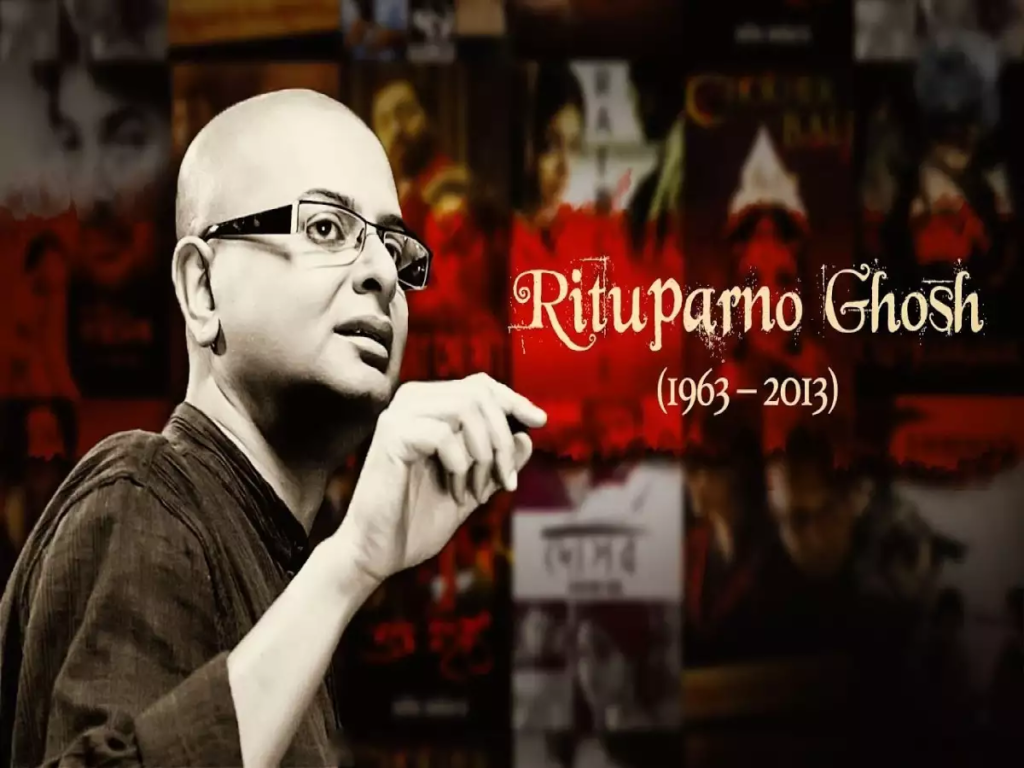Rituparna Ghosh: The Genius Filmmaker
There are films and then there are filmmakers that create an everlasting stamp on our minds. We may not agree, but the mainstream media has an undeniable effect on our thoughts, mindsets, and consequences.
And for me, Rituparno Ghosh has been one such powerful expression. I can never deny the fact that it was one of his movies that, for the first time, showed me a different side to motherhood or womanhood.
Unishe April. It was one of my first lessons in feminist outlook.
Rituparno was always an enigma within the straight-laced and upright Bengali society – an “effeminate” swish of hand, an “unmanly” voice, and straightforward talk. It is only appropriate, then, that Ghosh made his professional debut with Unishe April, a film that challenged the ideals of motherhood by juxtaposing the idea of a woman with her roles in Indian society.
The story of Unishe April

Unishe April, a film set in a South Kolkata residence on a rainy day, depicts the mother, Sarojini (an award-winning classical dancer played by Aparna Sen), and her daughter, Aditi (a recent medical graduate played by Debasree Ray).
Sarojini draws happiness from her profession and would never jeopardise it. After her father’s death, Aditi grew up in a boarding school with no attachment to her mother. The mother-daughter conflict arises from the daughter’s repressed anguish over losing her father as a kid and the consequent vilification of her mother. The resentment turns fatal, and Aditi attempts suicide after a breakup on a night washed out by a terrible storm.
The failed suicide attempt eventually opens all the floodgates. Twenty-six years of unspoken dialogue is released, and something unparalleled in Indian cinema occurs: a daughter challenges her mother’s capacity for giving, loving, and caring. In response, a mother doesn’t cut a sorry figure, but reveals her late husband’s mediocrities and then goes on to discuss their disastrous marriage.
Portrayal of a widow

Sarojini is hardly the perfect mother, wife, or widow in the context of Bengali cinema and wider Indian cinema. As a Hindu widow, she defies the norm by not embracing white attire. Instead, she is a dancer, clothed in magnificent saris, her forehead shining with a large red bindi, and always unapologetically joyful in her celebration of life. In the early days of the Nineties, presenting the female lead of a film as an absentee mother who does not fully participate in child rearing was nothing short of a revolutionary concept.
A woman not defined by her relationships

This was a movie that, for the first time, celebrated a woman who was not defined by her relationships. She might be a mother or a wife, but she is also an individual who has ambition, who
cannot be bound by the husband’s lack of ambition. Her success does not lie in her sacrifices but in her achievements. Sarojini’s passion and dedication beyond her relationships were something that I looked up to. This in itself was a revelation, considering how the mothers were portrayed on screen during that era. In that context, Unishe April provides a great feminist interpretation.
Decoding motherhood
However, in my opinion, the film’s greatest significance is that the writer-director made no pretence of glorifying or exalting the institution of motherhood while punishing and demeaning the individual women who engage in it. This was perhaps one of the first films to address motherhood theory, which investigates motherhood as an institution, an experience, and an identity. A story that went beyond the whitewashed imaginations of the mothers and daughters as entities.
It upholds the tragedy of a woman misunderstood by her daughter simply because her love does not fit into the idealised mother-love, which is often synonymous with sacrifice, the loss that becomes strangling in the process. Thirty years later, I can relate to it more than ever. We can also see a certain
sense of muted jealousy of Aditi towards her mother, for Sarojini is everything that she is not – desirable, passionate, and stronger woman. Three decades ago, the queer Bengali filmmaker made this
movie. It was courageous, to say the least.
Marriages are built on a patriarchal order
The flashbacks, told from Sarojini’s point of view, reveal the power dynamics that exist between a married couple under a patriarchal order. An order where the husband is the primary breadwinner and the wife
merely supplements his income if she earns anything at all. This demonstrates that even with a sizeable financial contribution, the urban, sophisticated Indian lady is not immune to the patriarchal power
structure in the household.
And with that revelation, it brings forth the vulnerability of the parents. Emotions such as sadness, envy, and desertion in these stories prompt the viewers to consider their limitations in picturing parents as immaculate entities and prompt us to reflect on our beliefs. Only a master storyteller like Ghosh could present the layering of emotions that humanises all the interactions and separates them from other clichéd portrayals. At a point, Sarojini says that, despite falling in love with her late husband (Aditi’s father), she never felt appreciated or understood in the marriage. This is the story of so many women trapped in a thankless marriage where they sacrifice their career, and happiness for family.
Though the movie seemed to be from the point of view of Aditi, it is Sarojini’s struggle that has always affected me. Manish, her late husband, his presence in an unequal marriage, and his everlasting presence
even after his death, is Sarojini’s personal battle. The one she cannot win nor lose.
In the scene where Sarojini confesses how she believes she was not destined for marriage since her creative sensibilities were not made to be domesticated; one actually feels her helplessness in being
trapped by societal norms.
I can go on and on about this movie, but the best thing you can do today is to watch Unishe April on your own. This beautiful gift of a movie from a filmmaker who wore his sexual identity with élan, spoke his
mind and startled viewers with the portrayal of insightful human relationships will always remain special.

















One Response